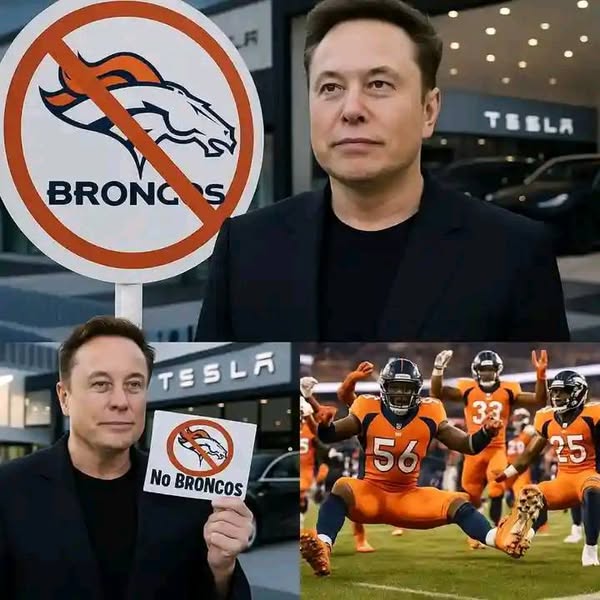
In a stunning and unprecedented move, Tesla CEO Elon Musk has reportedly issued an ultimatum to the Denver Broncos: partner with Tesla or face a ban preventing players from purchasing Teslas in the future. This bold statement has sent shockwaves through the sports and automotive industries, raising questions about the intersection of business, sports, and personal choice.
—
The Ultimatum
According to sources close to the situation, Musk has demanded that the Denver Broncos enter into a strategic partnership with Tesla. The terms of this partnership are not fully disclosed, but it is believed to involve Tesla providing electric vehicles to the team, possibly for player use, and integrating Tesla’s technology into the team’s operations. Musk has reportedly stated that if the Broncos refuse this partnership, he will implement a policy that prohibits players from purchasing Teslas in the future.
This move is seen as an extension of Musk’s previous ventures into sports, including significant investments in other NFL teams and partnerships with individual players. For instance, Musk has invested $10 billion into the Denver Broncos to overhaul the team’s staff and management, aiming to achieve top-tier results in the next season. Additionally, he has signed endorsement deals with NFL stars like T.J. Watt and Ryan Williams, valued at $850 million over three years, to promote Tesla’s vehicles and technology.
—
The Reaction
The reaction to Musk’s ultimatum has been mixed. Some view it as a strategic business move, leveraging the influence of a high-profile NFL team to promote Tesla’s brand. Others see it as an overreach, questioning the ethics of using professional athletes’ personal choices as leverage in corporate negotiations.
NFL executives have expressed concern over the potential implications of such a policy. While the league has not issued an official statement, sources indicate that there is unease about the precedent this could set. The NFL has long maintained a policy of allowing players to make personal decisions about endorsements and product purchases without interference from team ownership or sponsors.
—
The Bigger Picture
This development is part of a broader trend of increasing involvement of tech companies in professional sports. Companies like Tesla, Apple, and Amazon have been expanding their presence in the sports industry, not just through sponsorships, but by influencing team operations, player endorsements, and even the design of sports equipment. Musk’s actions highlight the growing influence of tech entrepreneurs in shaping the future of sports.
However, this also raises important questions about the balance of power between corporate interests and individual rights. While partnerships between companies and sports teams can be mutually beneficial, they should not come at the expense of personal freedoms. Athletes should have the autonomy to make personal choices, including the brands they endorse or the products they purchase, without fear of retribution from team owners or sponsors.
—
Looking Ahead
As of now, the Denver Broncos have not publicly responded to Musk’s ultimatum. It remains to be seen whether they will accept the proposed partnership or stand firm in their independence. The NFL, too, will likely need to address the broader implications of this situation, particularly if it leads to a policy that restricts players’ personal choices.
For fans and players alike, this development serves as a reminder of the complex dynamics between sports, business, and personal autonomy. While corporate partnerships can enhance the sports experience, they should not infringe upon the rights of individuals to make personal decisions.
—
In conclusion, Elon Musk’s reported threat to ban Denver Broncos players from purchasing Teslas unless they partner with Tesla is a significant development that underscores the growing influence of tech companies in professional sports. While such partnerships can offer benefits, they must be carefully managed to ensure they do not compromise the personal freedoms of athletes. As this situation unfolds, it will be important to monitor how the NFL, the Denver Broncos, and other stakeholders respond to the challenges posed by this new era of corporate involvement in sports.
NFL BOMBSHELL: Elon Musk Threatens to Ban Denver Broncos Players from Buying Teslas Unless They Partner with Tesla
In a move that has stunned the sports and automotive worlds, Tesla CEO Elon Musk has reportedly issued an ultimatum to the Denver Broncos: partner with Tesla or face a ban preventing players from purchasing Teslas in the future. This unprecedented demand has raised eyebrows and sparked debates about the intersection of business, sports, and personal choice.
The Ultimatum
According to sources close to the situation, Musk has demanded that the Denver Broncos enter into a strategic partnership with Tesla. The terms of this partnership are not fully disclosed, but it is believed to involve Tesla providing electric vehicles to the team, possibly for player use, and integrating Tesla’s technology into the team’s operations. Musk has reportedly stated that if the Broncos refuse this partnership, he will implement a policy that prohibits players from purchasing Teslas in the future.
This move is seen as an extension of Musk’s previous ventures into sports, including significant investments in other NFL teams and partnerships with individual players. For instance, Musk has invested $10 billion into the Denver Broncos to overhaul the team’s staff and management, aiming to achieve top-tier results in the next season. Additionally, he has signed endorsement deals with NFL stars like T.J. Watt and Ryan Williams, valued at $850 million over three years, to promote Tesla’s vehicles and technology.
The Reaction
The reaction to Musk’s ultimatum has been mixed. Some view it as a strategic business move, leveraging the influence of a high-profile NFL team to promote Tesla’s brand. Others see it as an overreach, questioning the ethics of using professional athletes’ personal choices as leverage in corporate negotiations.
NFL executives have expressed concern over the potential implications of such a policy. While the league has not issued an official statement, sources indicate that there is unease about the precedent this could set. The NFL has long maintained a policy of allowing players to make personal decisions about endorsements and product purchases without interference from team ownership or sponsors.
The Bigger Picture
This development is part of a broader trend of increasing involvement of tech companies in professional sports. Companies like Tesla, Apple, and Amazon have been expanding their presence in the sports industry, not just through sponsorships, but by influencing team operations, player endorsements, and even the design of sports equipment. Musk’s actions highlight the growing influence of tech entrepreneurs in shaping the future of sports.
However, this also raises important questions about the balance of power between corporate interests and individual rights. While partnerships between companies and sports teams can be mutually beneficial, they should not come at the expense of personal freedoms. Athletes should have the autonomy to make personal choices, including the brands they endorse or the products they purchase, without fear of retribution from team owners or sponsors.
Looking Ahead
As of now, the Denver Broncos have not publicly responded to Musk’s ultimatum. It remains to be seen whether they will accept the proposed partnership or stand firm in their independence. The NFL, too, will likely need to address the broader implications of this situation, particularly if it leads to a policy that restricts players’ personal choices.
For fans and players alike, this development serves as a reminder of the complex dynamics between sports, business, and personal autonomy. While corporate partnerships can enhance the sports experience, they should not infringe upon the rights of individuals to make personal decisions.
In conclusion, Elon Musk’s reported threat to ban Denver Broncos players from purchasing Teslas unless they partner with Tesla is a significant development that underscores the growing influence of tech companies in professional sports. While such partnerships can offer benefits, they must be carefully managed to ensure they do not compromise the personal freedoms of athletes. As this situation unfolds, it will be important to monitor how the NFL, the Denver Broncos, and other stakeholders respond to the challenges posed by this new era of corporate involvement in sports.







